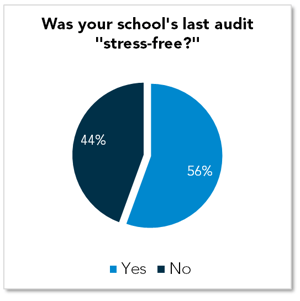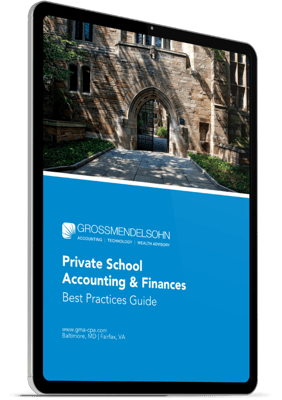We recently polled private school heads and financial staff to find out whether their last audit was “stress-free.” Not surprisingly, nearly half of respondents answered “no.”
While it’s easy to look at your school’s annual audit as a necessary evil, not to mention time consuming and stress inducing, there are several often overlooked benefits to the annual audit.
 An annual audit can help you satisfy your donors’ expectations of full financial accountability and transparency. An independent audit can also help assure your board members that your school’s finances are on the up and up, thereby minimizing their personal liability.
An annual audit can help you satisfy your donors’ expectations of full financial accountability and transparency. An independent audit can also help assure your board members that your school’s finances are on the up and up, thereby minimizing their personal liability.1. Prepare ahead of time
This should go without saying, but when you prepare ahead of time for your audit, it’s much more likely that the whole process will go smoothly. Ask your auditor exactly what they need and when they need it by. Organize vendor, grant/program and journal entry files. Document your procedures and controls via narratives or flowcharts. Prepare trial balances and account reconciliations prior to the audit.
Most importantly, communicate with your auditor if you’re unclear on how to prepare, or think you might not be ready by the agreed-upon date.
2. Be clear and realistic in your expectations
Each year, your CPA firm should give you an engagement letter that establishes expectations and responsibilities of both your school’s management team and the outside auditors. While an experienced and well organized private school auditor can help minimize disruption for your staff, you can realistically expect some interruption to your normal routine. Expect your auditors to have questions for you while they’re working onsite. Be realistic in allowing time for your auditors to meet with you and your staff.
Your audit isn’t something you should start thinking about the month before fieldwork starts.
3. Address risks throughout the year
Taking steps year-round to minimize your school’s risks can go a long way toward making your annual audit less stressful. Although it’s tempting to squeak through the audit and stick your financial statements in a dusty file cabinet, you’ll be better off developing a mindset that will help mitigate potential audit issues throughout the year.
For example, take the approach of full disclosure when it comes to new or unusual transactions. Periodically review your accounting and procedures manual to assess whether they are being followed. Put simply, address potential problems before they come to light during your annual audit.
4. Be ready to address control deficiencies
Your auditors will apply risk standards during the audit to determine if there are any internal control deficiencies in your school, then send you a draft SAS115 letter, also known as a management letter, to summarize any internal control matters. Your school’s management team will need to prepare a written response to each finding to indicate how the matter will be corrected.
While it can be disheartening to get word that your school has deficiencies or weaknesses in its controls, the auditor’s feedback can ultimately put your school on the path to stronger financial management. This is one of the real benefits of an audit. Only when you are aware of deficiencies, often in areas such as classification and recognition of revenue, grant reporting, and segregation of duties, can you improve your school’s financial position and overall health – and hopefully make your next audit stress-free.
5. Stay in touch with your auditors
There are a number of must-know accounting and financial reporting issues that are unique to private schools. Get in touch with your auditor anytime during the year to get answers to questions about things like classification of net assets, accounting for pledges, and recording split interest agreements. A few minutes on the phone now could save you (and your auditor) a major headache at year end. Likewise, a good auditor will stay in touch with you throughout the year to keep you abreast of changes affecting your school.
Final Thoughts
While your auditor must remain independent, your relationship with your auditor does not need to be adversarial. A collaborative, positive relationship with your auditor will increase the odds that your next audit will be a lot less stressful.
Need Help?
Contact us online or call 800.899.4623.


